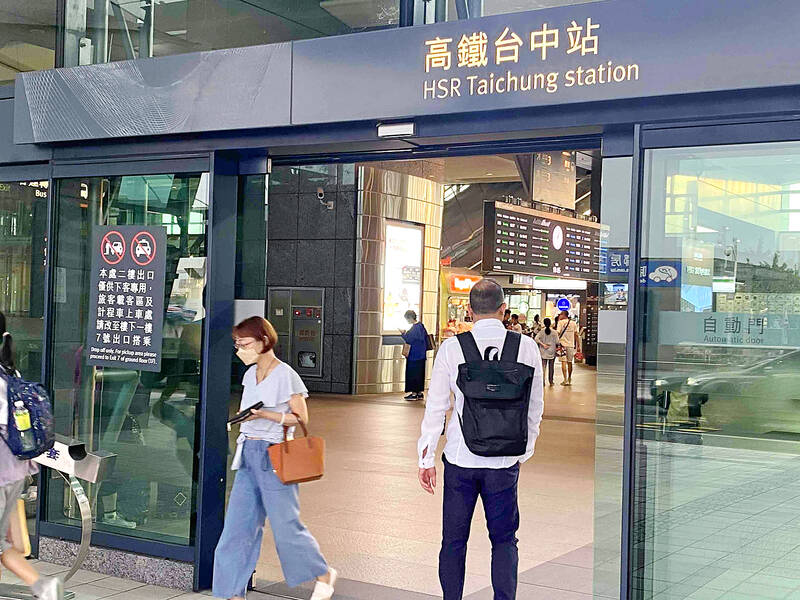Taiwan High Speed Rail Corp (THSR) yesterday unveiled timetables showing expected surges in non-reserved ticket sales during the Double Ten National Day holiday, and suggested people avoid purchasing tickets during those periods.
The company on Sunday experienced a single-day record high of 338,000 passengers, leading to more than two hours of waiting time for some standing passengers.
The three peak periods are from 5pm tomorrow to 8pm, and 8am on Saturday to 11am for southbound trains, and 1pm on Saturday to 8pm for northbound trains, the company said.

Photo: Huang Hsu-lei, Taipei Times
The company said it would continue issuing updates on seating availability for trains labeled as “fast-selling” — indicating limited seating options for extended trips — and recommended travelers check these updates and complete their reservations as early as possible.
As of yesterday morning, the company said that “fast-selling” trains included southbound trains from tomorrow at noon to Saturday night and noon to the evening on the Double Ten National Day, the company said.
“Fast-selling” northbound trains include the ones leaving stations after work hours — between 4pm and 5pm — tomorrow, afternoons to nighttime seats for all trains on Monday and the entirety of Tuesday, the company added.
The company urged passengers who have already pre-purchased seats to use its mobile app or kiosks at convenience stores to collect their tickets and save time at stations.
The company said it would consider initiating certain control measures — such as prioritizing entry for reserved-seat passengers, directing non-reserved-seat passengers to board both express and non-express trains, or limiting the number of non-reserved-seat passengers entering a station — to ensure swift boarding processes.
It also called on non-reserved-seat passengers to refrain from taking reserved seats.
The company said it would be cautious when allowing passengers without reserved seats to stand in aisles or connecting compartments between cars.
An additional 190 trains would be added to the schedule from tomorrow to Wednesday, it said.

Costa Rica sent a group of intelligence officials to Taiwan for a short-term training program, the first time the Central American country has done so since the countries ended official diplomatic relations in 2007, a Costa Rican media outlet reported last week. Five officials from the Costa Rican Directorate of Intelligence and Security last month spent 23 days in Taipei undergoing a series of training sessions focused on national security, La Nacion reported on Friday, quoting unnamed sources. The Costa Rican government has not confirmed the report. The Chinese embassy in Costa Rica protested the news, saying in a statement issued the same

Taiwan’s Liu Ming-i, right, who also goes by the name Ray Liu, poses with a Chinese Taipei flag after winning the gold medal in the men’s physique 170cm competition at the International Fitness and Bodybuilding Federation Asian Championship in Ajman, United Arab Emirates, yesterday.

A year-long renovation of Taipei’s Bangka Park (艋舺公園) began yesterday, as city workers fenced off the site and cleared out belongings left by homeless residents who had been living there. Despite protests from displaced residents, a city official defended the government’s relocation efforts, saying transitional housing has been offered. The renovation of the park in Taipei’s Wanhua District (萬華), near Longshan Temple (龍山寺), began at 9am yesterday, as about 20 homeless people packed their belongings and left after being asked to move by city personnel. Among them was a 90-year-old woman surnamed Wang (王), who last week said that she had no plans

TO BE APPEALED: The environment ministry said coal reduction goals had to be reached within two months, which was against the principle of legitimate expectation The Taipei High Administrative Court on Thursday ruled in favor of the Taichung Environmental Protection Bureau in its administrative litigation against the Ministry of Environment for the rescission of a NT$18 million fine (US$609,570) imposed by the bureau on the Taichung Power Plant in 2019 for alleged excess coal power generation. The bureau in November 2019 revised what it said was a “slip of the pen” in the text of the operating permit granted to the plant — which is run by Taiwan Power Co (Taipower) — in October 2017. The permit originally read: “reduce coal use by 40 percent from Jan.